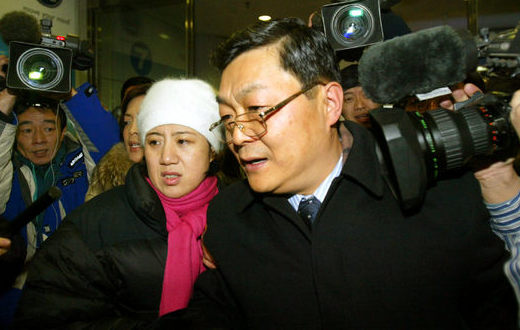 |
|
O Kwang-chol, president of North Korea's Foreign Trade Bank of Korea, arrived on December 19 in Beijing for the bilateral talks regarding the financial sanctions in place on North Korea with his U.S. counterpart. (Yonhap)
|
Planned one-on-one discussions begin at end of second day
At the end of the second day of the six-party talks on North Korea’s nuclear program, bilateral meetings were held between North Korea and each of the other members, save for Japan. For much of the first two days of the talks, observers had worried about the slow start to the bilateral discussions, seen as the key to progress in the negotiations. "North Korea and the U.S. held as many as 13 bilateral meetings during the fourth round of six-party talks last year. The September 19th Joint Statement was the result of that process." recalled a South Korean diplomat that participated in the multilateral disarmament negotiations. After a year of hiatus, six nations - South and North Korea, the U.S., Japan, China, and Russia - sat together again in Beijing on December 16, to resume the talks aimed at dismantling Pyongyang’s nuclear weapons program.However, except for official meetings, North Korea’s nuclear envoy Kim Kye-gwan at first stayed in his hotel room. As of December 18, Kim had held just one bilateral meeting with his Chinese counterpart. But ahead of the talks, U.S. delegation chief Christopher Hill showed his willingness to hold a one-on-one meeting with Kim, saying that bilateral meetings were indeed scheduled during the multilateral negotiations. Those talks came to fruition on the evening of December 19. During the slow start to bilateral discussion, some observers said that the "mood" needed to develop for those sideline talks to commence. Despite the start of the talks, pessimism still lingers, as experts cite the North’s unexpected "dormant" stance at these talks, a far cry from last year’s actively participating delegation. In a keynote speech, Kim reiterated that a "nuclear-free Korean Peninsula" is something that North Korea’s founder Kim Il-sung wished for before his death. However, the North’s nuclear envoy also raised the stakes by insisting that all sanctions and "anti-North Korea policies" of the U.S be lifted altogether prior to any action on the North’s part. Kim’s tough rhetoric is clouding the prospects of a breakthrough in the ongoing six-party talks, experts say. Some even worry that Kim made such preconditions in exchange for dismantling the North’s nuclear weapons program after judging that compromises could not be made under the Bush administration. The U.S. side seems to be trying to remain optimistic about the possible results of this round of negotiations, saying that more serious talks were held on December 19 than on the day prior. State Department spokesman Sean McCormack said that the negotiations did face a bumpy road, but dismissed any pessimism by saying that such tough preconditions are just part of the North’s negotiating tactics. Observers say the North is treading water very carefully, planning to look for signs from the scheduled working-level talks, which are supposed to deal with the issue of Macau-based Banco Delta Asia (BDA), where North Korea’s financial assets have been frozen since last September. The financial issue is one of the most important preconditions that the North had made before coming back to the negotiating table. The mood could just as easily turn easily positive, as well, other observers said. But this would only happen if the U.S. shows a flexible stance on the BDA issue and places priority on dismantling the North’s nuclear weapons program above all else, they said. Please direct questions or comments to [englishhani@hani.co.kr]





